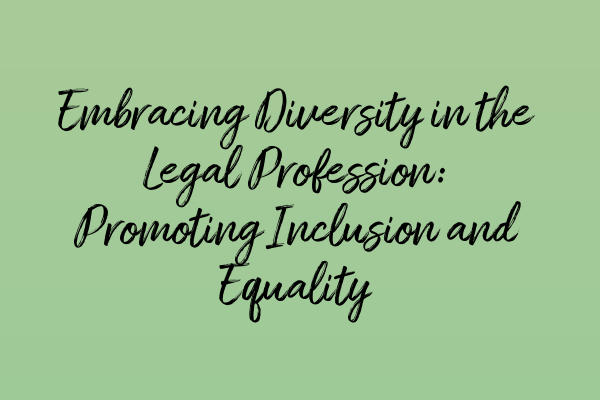Embracing Diversity in the Legal Profession: Promoting Inclusion and Equality
In recent years, the legal profession has made significant strides towards embracing diversity and promoting inclusion and equality. This is a topic of great importance, as the legal profession plays a crucial role in society and should reflect the diverse communities it serves. In this blog post, we will explore the importance of embracing diversity in the legal profession, the challenges that exist, and the steps being taken to promote inclusion and equality.
Diversity encompasses a range of characteristics, including but not limited to race, ethnicity, gender, sexual orientation, socio-economic background, and disability. Embracing diversity means recognizing and valuing these differences, challenging biases, and creating an environment where everyone feels included and can thrive. By embracing diversity, the legal profession can benefit from a range of perspectives, experiences, and ideas, leading to better outcomes for clients and society as a whole.
One of the key challenges facing the legal profession is the underrepresentation of certain groups, particularly in senior positions. This is often referred to as the “glass ceiling” and is a result of various systemic barriers that hinder progress for individuals from diverse backgrounds. These barriers can include unconscious bias, lack of mentorship and support, and limited opportunities for advancement.
To address these challenges, there is a growing awareness and commitment from legal professionals, law firms, and regulatory bodies to promote diversity and equality. There is a recognition that diversity should not only be seen as a moral imperative but also as a business imperative. Increasingly, clients are demanding diverse legal teams to better understand their needs and provide effective representation.
Law firms are implementing various strategies to promote diversity, such as creating diversity and inclusion committees, establishing mentorship and sponsorship programs, and implementing unconscious bias training. These initiatives aim to create an inclusive culture where individuals from diverse backgrounds can succeed and advance within the profession.
Regulatory bodies are also playing a crucial role in promoting diversity and equality. The Solicitors Regulation Authority (SRA), for example, has set diversity and inclusion as one of its strategic priorities. They have implemented requirements for law firms to collect and publish diversity data, encouraging transparency and accountability. By collecting this data, the SRA can monitor progress and identify areas for improvement.
To further promote diversity in the legal profession, it is important to address barriers to entry and create opportunities for individuals from diverse backgrounds. This includes providing support and information on financing a law degree, understanding the costs and options available (link to related article: ‘Financing Your Law Degree: Understanding Costs and Options’). It also involves ensuring that training courses, such as the Bar Professional Training Course (BPTC), are accessible and inclusive for all aspiring solicitors (link to related article: ‘A Closer Look at the Bar Professional Training Course (BPTC)’).
Technology also has a role to play in promoting diversity and inclusion in the legal profession. It can help increase access to legal services for marginalized communities and improve the efficiency and effectiveness of legal processes (link to related article: ‘The Role of Technology in Modern Legal Practice’). By embracing technology, law firms can better serve diverse clients and create more inclusive work environments.
In conclusion, embracing diversity in the legal profession is crucial for promoting inclusion and equality. It requires a collective effort from legal professionals, law firms, regulatory bodies, and society as a whole. By recognizing the importance of diversity, addressing barriers, and implementing inclusive practices, the legal profession can better serve its clients, create a more just society, and remain relevant in an ever-changing world.
For more information on topics related to the legal profession and staying ahead of current industry trends in the UK, please visit our related articles page (link to related article: ‘Staying Ahead: Current Legal Industry Trends in the UK’). Additionally, if you’re interested in learning about prominent law firms in the UK, please check out our article on that topic as well (link to related article: ‘A Look into Prominent Law Firms in the UK’).


Leave a Reply